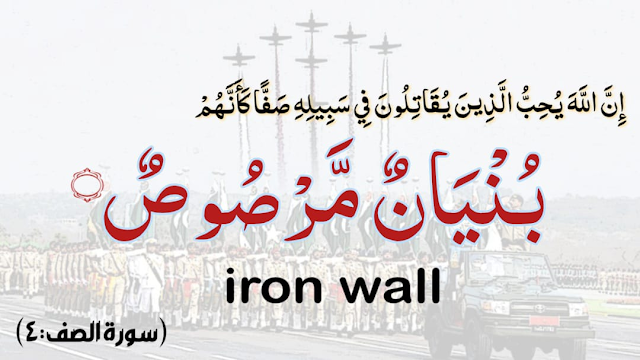What is “Bunyānun Marsūs”?
“Bunyānun Marsūs” are the concluding
words of verse 4 in Surah As-Saff. The phrase translates to “a solid,
reinforced wall” or “a wall fused with lead and iron.”
To better understand its context and
depth, let us examine the full verse:
Surah As-Saff: Verse 4
إِنَّ اللَّهَ يُحِبُّ الَّذِينَ يُقَاتِلُونَ
فِي سَبِيلِهِ صَفًّا كَأَنَّهُمْ بُنْيَانٌ مَرْصُوصٌ
Translation:
“Indeed, Allah loves those who fight
in His cause in ranks as though they are a solid, unified structure.”
What is Bunyānun Marsūs?
Explanation:
This verse indicates that Allah
loves those who remain steadfast in His cause and stand firm like a wall
reinforced with iron and lead. Their unity, strength, and unwavering resolve
make them an embodiment of this Qur’anic imagery.
According to Saeed bin Jubair (RA),
this verse instructs believers to stand strong and united when facing the
enemy—just like a solid wall that cannot be shaken.
Strategic Military Insight:
From this verse, Islamic scholars
have derived a crucial battlefield principle: a soldier should never break
ranks unless absolutely necessary—such as:
Delivering an urgent message to the
commander
Responding to a direct challenge
from the enemy
Executing a critical command
(Ref: Tafsir Tabyān al-Qur’an)
If a commander has stationed a
soldier at a specific location, it is obligatory for him to remain there unless
military strategy demands repositioning. However, deserting the battlefield or
disobeying the leader’s command is not permitted for a true warrior of Islam.
“Bunyānun Marsūs” in Islamic
History:
Islamic history offers countless
examples of armies that achieved great victories by practicing the principle of
“Bunyānun Marsūs.” Among the earliest and most blessed examples is the Battle
of Badr, where the Companions of the Prophet (PBUH) stood in perfect formation
with firm belief and resolve.
From the fields of Badr to the
conquest of Constantinople, Islamic victories have always been tied to
discipline, unity, and faith.
Contemporary Application – The
Pakistan Army:
In the present age, the practical
example of this Qur’anic verse can be seen in the ranks of modern Muslim
armies, particularly the Pakistan Army. Known for its discipline, cohesion, and
patriotic spirit, the Pakistan Army continues to stand tall like a solid wall
against its enemies—truly a living reflection of “Bunyānun Marsūs.”
Modern Military Relevance:
Modern military doctrines, such as
“Unity of Command” and “Coordination,” echo the same principles taught in the
Qur'an 1400 years ago.
Even today, military strategists
agree that success in war depends not just on weaponry but on how
well-organized, synchronized, and united a force is.
This is precisely the message
conveyed by the Qur'an through the powerful phrase: “Bunyānun Marsūs.”
Long Live Pakistan
By: Ghulam Mustafa Amini







0 Comments